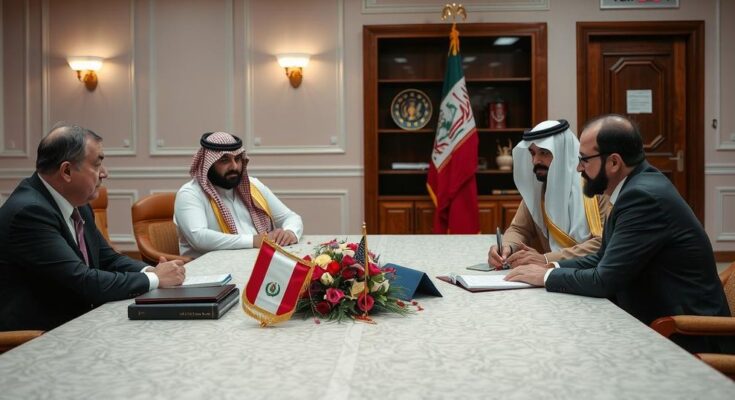During their visit to Qatar, Syria’s new Islamist rulers urged the U.S. to lift sanctions hindering the country’s recovery. They stressed that these sanctions are negatively affecting the Syrian people rather than the former regime. Discussions highlighted plans for rebuilding Syria’s relations with other nations and emphasized a cooperative approach in preventing foreign interference in domestic affairs.
In a recent diplomatic visit to Qatar, Syria’s new Islamist regime leaders highlighted the detrimental impact of U.S. sanctions on the country’s recovery efforts. During a press briefing following discussions with Qatari officials, including Prime Minister Sheikh Mohammed bin Abdulrahman Al Thani, Syrian Foreign Minister Asaad Hassan al-Shibani stated that the sanctions hinder the development and support that the Syrian people desperately need. He called for the U.S. to reconsider these sanctions, arguing they now adversely affect the citizens rather than merely targeting the previous Assad regime.
Shibani’s remarks came during his second foreign visit since the ousting of former President Bashar al-Assad by rebels in December. The discussions with Qatari officials also included concrete plans for future cooperation to help Syria rebuild its relations with Arab nations and restore civil rights to its citizens. Furthermore, the Syrian delegation emphasized their commitment to maintaining stability and preventing external interference in the nation’s internal affairs, as they create a framework for governance that represents all Syrian constituents.
The visit to Qatar is part of a broader effort by the new Syrian authorities to strengthen ties with neighboring countries such as the United Arab Emirates and Jordan, with the aim of ensuring economic recovery and fostering partnerships. This diplomatic initiative follows their initial engagement with Saudi Arabia to explore support for Syria’s political transition.
Shibani’s comments reflect a shift in Syria’s foreign policy approach under the new administration, which seeks to lay a foundation for recovery and international cooperation, building partnerships amidst a fragmented regional landscape.
The meetings signify a critical step in reshaping Syria’s diplomatic relations while addressing the urgent need for international support as the nation navigates its recovery process post-conflict.
The context of this article centers on the post-civil war landscape of Syria, marked by the recent ousting of long-standing President Bashar al-Assad. The elevation of new Islamist leadership showcases a significant shift in governance for Syria, which has faced international isolation due to prior regime actions during the civil unrest beginning in 2011. U.S. sanctions, initially aimed at the Assad regime, are now seen by the new leadership as impediments to restoring stability and enabling recovery efforts for the Syrian people. The diplomatic engagements with Qatar and potential discussions with other regional powers underscore the urgency for international collaboration towards rebuilding the nation and enhancing its foreign relationships.
In summary, the recent visit to Qatar by Syria’s new Islamist rulers marks a pivotal moment in the country’s foreign relations, as they advocate for the lifting of U.S. sanctions to facilitate recovery efforts. The dialogue emphasizes a commitment to national reconstruction and stability while aiming to foster productive partnerships with neighboring nations. As Syria navigates its transition, the leadership’s outreach reflects a broader strategy to enhance diplomatic ties and support post-conflict recovery.
Original Source: www.hindustantimes.com




